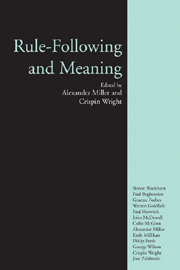Book contents
- Frontmatter
- Contents
- Acknowledgements
- The Contributors
- 1 Introduction
- 2 Skepticism and Semantic Knowledge
- 3 The Individual Strikes Back
- 4 Wittgenstein on Following a Rule
- 5 Wittgenstein, Kripke and Non-Reductionism about Meaning
- 6 Kripke on Wittgenstein on Rules
- 7 Critical Notice of Colin McGinn's Wittgenstein on Meaning
- 8 Meaning and Intention as Judgement Dependent
- 9 The Rule-Following Considerations
- 10 The Reality of Rule-Following
- 11 Truth Rules, Hoverflies, and the Kripke–Wittgenstein Paradox
- 12 Kripke on Wittgenstein on Normativity
- 13 Meaning, Use and Truth
- 14 Kripke's Normativity Argument
- Guide to Further Reading
- Index
1 - Introduction
- Frontmatter
- Contents
- Acknowledgements
- The Contributors
- 1 Introduction
- 2 Skepticism and Semantic Knowledge
- 3 The Individual Strikes Back
- 4 Wittgenstein on Following a Rule
- 5 Wittgenstein, Kripke and Non-Reductionism about Meaning
- 6 Kripke on Wittgenstein on Rules
- 7 Critical Notice of Colin McGinn's Wittgenstein on Meaning
- 8 Meaning and Intention as Judgement Dependent
- 9 The Rule-Following Considerations
- 10 The Reality of Rule-Following
- 11 Truth Rules, Hoverflies, and the Kripke–Wittgenstein Paradox
- 12 Kripke on Wittgenstein on Normativity
- 13 Meaning, Use and Truth
- 14 Kripke's Normativity Argument
- Guide to Further Reading
- Index
Summary
One of the most widely discussed books in recent Anglo-American philosophy is Saul Kripke's Wittgenstein on Rules and Private Language. Kripke's Wittgenstein's skeptic, drawing mainly on materials from Wittgenstein's Philosophical Investigations and Remarks on the Foundations of Mathematics, argues for a “skeptical paradox” about meaning: there is no fact of the matter in virtue of which an ascription of meaning, such as “Jones means addition by ‘+’”, is true or false; and so, since nothing turns on the nature of Jones or of the ‘+’ sign in particular, there is no fact of the matter as to whether any speaker means one thing rather than another by the expressions of his language. KW then attempts to neutralise the impact of the skeptical argument. Even though there are no facts in virtue of which ascriptions of meaning are true or false, the “insane and intolerable” (K, p. 60) conclusion that “all language is meaningless” (K, p. 71) can be avoided via KW's “skeptical solution” to the “skeptical paradox”: ascriptions of meaning can be viewed as possessing some non fact-stating role, so the propriety of ascribing meanings to linguistic expressions isn't threatened by the argument to the skeptical paradox. It emerges that the “skeptical solution” is available only for languages spoken by linguistic communities. A corollary of KW's neutralisation of the skeptical paradox is thus that there can be no such thing as “solitary” language.
- Type
- Chapter
- Information
- Rule-Following and Meaning , pp. 1 - 15Publisher: Acumen PublishingPrint publication year: 2002
- 1
- Cited by



